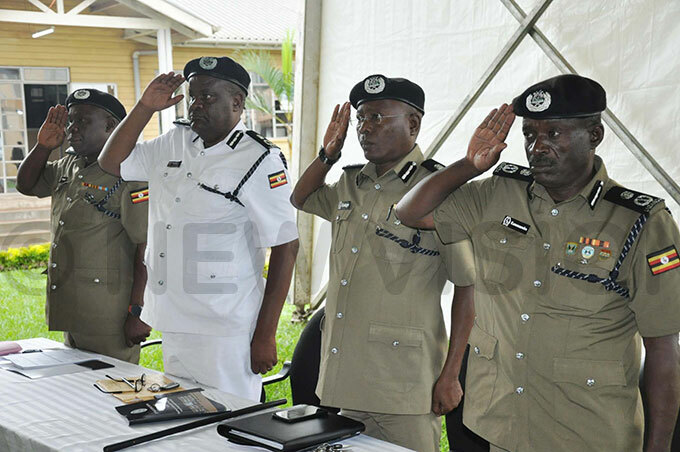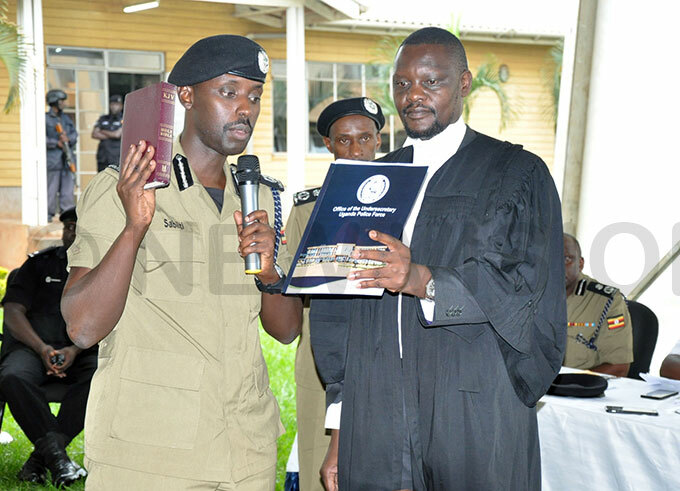Museveni meets top Police bosses
Nov 19, 2019
The meeting, which took place at the Police headquarters in Naguru, discussed security issues.

SECURITY
The Commander-in-Chief of the armed forces, Yoweri Museveni, addressed the Police council and commanders of Kampala Metropolitan Police today.
The meeting, that took place at the Police headquarters in Naguru, discussed security issues. The meeting comes hours after the Police Council meeting which was held yesterday in Kampala.
The meeting co-chaired by the Inspector General of Police (IGP), Martins Okoth Ochola and his deputy, Maj. Gen. Sabiiti Muzeeyi, was convened under the theme, Strengthening Our Achievements and Finding Solutions to Policing Challenges to Guarantee Public Safety. The council is mandated to sit twice a year, chaired by the internal affairs minister, Jeje Odongo.
However, according to Ochola, Odongo did not interact with the officers because he was attending a Cabinet meeting.
The first council meeting sat in 1995. The Council was scheduled to address other issues. These include senior Police officers' contracts, the proposed establishment of a Police reserve force, Police officers' welfare, including accommodation, disciplinary system, and training plus the reported misappropriation of Police officers' funds under there Exodus Savings and Credit Cooperative Organisation.
Other issues to be discussed include the 2021 general elections, human rights violations, presentation on technology applications on traffic management, power and energy innovations as well as building an integrated internal economy.
 Assistant inspector general of police Asuman Mugenyi, Kasiima Steven, Assistant Inspector General of Police, Asan Kasingye, Assistant inspector general of police and Jesse Kamunanwire welcoming the inspector general of police Okoth Ochola during the 25th police council meeting
Assistant inspector general of police Asuman Mugenyi, Kasiima Steven, Assistant Inspector General of Police, Asan Kasingye, Assistant inspector general of police and Jesse Kamunanwire welcoming the inspector general of police Okoth Ochola during the 25th police council meeting
Also on the line-up was formation of a women's Police association, gender policy, policy on peace and support operations, health insurance, reconstitution of Police committees, draft policy on fleet management, forensic capabilities and awarding of medals.
Routinely, medals are awarded to officers who have served for 30 years. However, officers have recently insisted that those that have served for 25 years should be considered. By press time, the discussions were still going on.
In his opening remarks, before a closed-door session, Ochola explained that the main purpose of the council is to "review the force's policies in line with it's mandate, assess implementation levels as well as recognise achievements and formulate strategies to overcome the dynamic policing demands of the ever-changing environment".
Listing some of the achievements, the Police political commissar, Asan Kasingye, told journalists: "Establishment of Closed Circuit Television cameras helped in the clump down on criminals in Kampala, prompting the thugs to run to rural areas."
Kasingye cited recent cases in Bushenyi and Mbarara, where ‘goons' have attacked, assaulted and robbed students of the Law Development Centre. "Intelligence-led operations has been the missing link in fighting crime," Kasingye said, explaining that after they discovered the problem, "it will be much easier to crack the whip on criminals".
 Sabiiti Muzeyi, the Deputy Inspector General of Police swears in as a member of the police council
Sabiiti Muzeyi, the Deputy Inspector General of Police swears in as a member of the police council
The Police Council comprises the IGP and his deputy, directors, heads of specialised units, regional Police commanders, representatives of constables and other ranks, gender and non-commissioned officers.
New entrants into the force at various levels were sworn in during the first sitting. These included Sabiiti and 26 others. Security plan Last month, Sabiiti announced a robust plan to combat the crime characterised by robbery and burglary.
Sabiiti said the Police, among other measures, will set up rapid response teams in zones/villages in order to ensure that all cases of robbery reported are promptly acted on.
This followed a directive from President Museveni to Sabiiti to work out a quick plan of action to combat criminal gangs in Kampala and surrounding areas. In his directive, Museveni instructed Sabiiti to submit, within two days, a plan of how the criminals terrorising Kampala and the surrounding areas would be dealt with.
Sabiiti told New Vision the Police are implementing the new security measures in Kampala and that the plan has been rolled out across the country. Hotlines for local communities Sabiiti said each of the Police stations countrywide will have a counter hotline, besides the known mobile telephone numbers of the commanders, which he said are not reliable.
"Each household must have this counter hotline number. It is the one residents should call in case of an emergency. These numbers will be operational 24 hours, seven days a week," Sabiiti said. Suggestion boxes, LDUs, bodabodas Sabiiti also said the Police would introduce suggestion boxes in open places in villages.
The boxes will be opened by specific personnel. "Anyone can volunteer information through the suggestion box. You can leave your contact if you wish and they will be kept confidential. But you can also give us information without necessarily leaving your contact," he said.
Sabiiti acknowledged that bodabodas were still being used by criminals. He said the National Security Council was still working out ways of regulating and registering the bodabodas.
Over the past few years, gangsters have resorted to using fast-moving motorcycles when committing crime. The latest such incident was during the kidnap and murder of social worker Maria Nagirinya and her driver Ronald Kitayimbwa.
